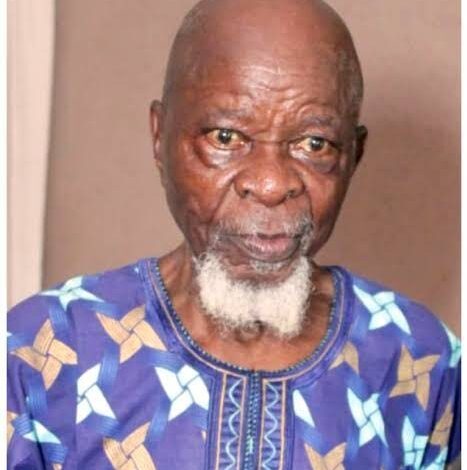Celebrated Nollywood Icon, Charles Olumo, Passes Away At 101

The Nigerian film industry is in mourning following the passing of one of its oldest and most revered actors, Abdulsalam Sanyaolu, popularly known by his stage names Charles Olumo and Agbako. At 101, Agbako was celebrated not only for his longevity but for his tremendous contributions to the Yoruba film industry and Nollywood at large. His death was announced by Bolaji Amusan, also known as Mr. Latin, the president of the Theatre Arts and Motion Pictures Practitioners Association of Nigeria (TAMPAN), on Instagram. Mr. Latin wrote, “#tampanglobal announces the passing of Pa Charles Olumo Sanyaolu, fondly known as AGBAKO. Details of the burial arrangements will be shared at a later time. Good night father, 25/02/1923 to 31/10/2024.”
In a heartfelt tribute, veteran Nollywood actor Jide Kosoko also confirmed Agbako’s passing, writing, “Good night ooo, Baba Charles a.k.a Agbako, 101 years, ba wasa ba. R I P.” The industry and fans across Nigeria and beyond are paying tribute to the iconic actor who graced the silver screen for decades, leaving an indelible legacy in Yoruba cinema.
Agbako’s Early Life and Entry into Film
Born on February 25, 1923, in Abeokuta, Ogun State, Charles Olumo grew up in a culturally rich Yoruba society that valued oral traditions, drama, and stage performances. His passion for the arts was apparent from a young age, and he soon gravitated toward acting. In the early years of his career, Agbako was involved in traveling theater troupes, which performed across southwestern Nigeria. These troupes were instrumental in preserving Yoruba culture, and Agbako’s role in them honed his skills and established him as a serious actor.
Rise to Fame and the Birth of “Agbako”
As he transitioned into the film industry, Olumo took on the stage name “Agbako,” which roughly translates to “troublemaker” or “danger” in Yoruba—a name that became synonymous with the villainous and fearsome roles he portrayed on screen. Agbako’s characters were often complex and multifaceted, and he quickly earned a reputation for bringing intensity and authenticity to his roles. Audiences were captivated by his portrayal of antagonists, often seeing him as the embodiment of Yoruba traditional drama’s nuanced villain archetype.
Agbako became known for his roles in classic Yoruba films such as Olowo Aiye, Fopomoyo, Asiri Nla, and countless others, where he consistently delivered powerful performances that resonated with audiences. He became particularly skilled at portraying menacing and intense characters, endearing him to fans who marveled at his ability to embody his roles fully. Over time, Agbako’s name became emblematic of Yoruba cinema’s golden era, and he was celebrated not only as a villain but as a cultural custodian who helped to elevate Yoruba folklore through his craft.
A Trailblazer in Yoruba and Nigerian Cinema
Agbako was one of the pioneers who helped shape the Nigerian film industry. His career coincided with the rise of Yoruba cinema in the 1970s and 1980s when theater practitioners began adapting stage plays into films. Agbako, alongside other legends like Hubert Ogunde, Oyin Adejobi, and Duro Ladipo, was at the forefront of this transition, helping to establish the Yoruba film genre and its unique blend of drama, cultural themes, and traditional storytelling.
Known for his unwavering dedication to the craft, Agbako continued to act well into his later years, contributing to Nollywood’s growth and remaining relevant even as the industry evolved. While many actors of his era retired, Agbako adapted to the changing landscape, bringing his extensive experience and depth to Nollywood movies. His adaptability and longevity in the industry were testaments to his talent and commitment.
Legacy and Impact
Agbako’s influence on younger generations of actors cannot be overstated. Many contemporary Yoruba and Nollywood actors view him as a role model, acknowledging that his performances set a high standard for dedication and excellence. He was a mentor to numerous actors and a constant presence in the lives of those who looked up to him as an elder in the field.
As a pioneer in the industry, Agbako’s legacy transcends his film roles; he represented the embodiment of Yoruba culture, philosophy, and values. In his films, he often explored the themes of good versus evil, justice, and the consequences of moral failure—universal themes that resonated deeply with Nigerian audiences. He also contributed to the global visibility of Nigerian cinema and set the stage for future generations of actors and filmmakers.
A Final Farewell to a National Treasure
Agbako’s passing marks the end of an era for Nigerian cinema. He lived through significant phases in the country’s history, from colonial times to independence, from military rule to democracy, and the evolution of Nollywood. Despite his intimidating on-screen persona, those who knew him personally often described him as kind, humble, and full of wisdom. His life spanned a century, and with it, he witnessed Nigeria’s growth and challenges, all while contributing to its cultural heritage.
As fans, colleagues, and admirers mourn his loss, the memories of his roles live on in the films that defined him and the industry. Abdulsalam Sanyaolu “Agbako” will forever remain a cherished figure in Nigerian cultural history—a testament to the power of storytelling and the enduring impact of an artist dedicated to his craft. His contributions to the Nigerian film industry and the preservation of Yoruba culture will not be forgotten.



